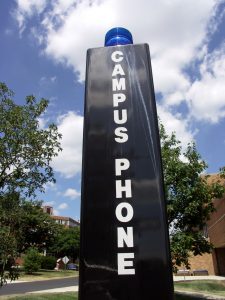
RAINN urges students to take the following precautions on campus:
Know your resources. Who should you contact if you or a friend needs help? Where should you go? Locate resources such as the campus health center, campus police station, and a local sexual assault service provider. Notice where emergency phones are located on campus, and program the campus security number into your cell phone for easy access.
Stay alert. When you’re moving around on campus or in the surrounding neighborhood, be aware of your surroundings. Consider inviting a friend to join you or asking campus security for an escort. If you’re alone, only use headphones in one ear to stay aware of your surroundings.
Be careful about posting your location. Many social media sites, like Facebook and Foursquare, use geolocation to publicly share your location. Consider disabling this function and reviewing other social media settings.
Make others earn your trust. A college environment can foster a false sense of security. They may feel like fast friends, but give people time earn your trust before relying on them.
Think about Plan B. Spend some time thinking about back-up plans for potentially sticky situations. If your phone dies, do you have a few numbers memorized to get help? Do you have emergency cash in case you can’t use a credit card? Do you have the address to your dorm or college memorized? If you drive, is there a spare key hidden, gas in your car, and a set of jumper cables?
Be secure. Lock your door and windows when you’re asleep and when you leave the room. If people constantly prop open the main door to the dorm or apartment, tell security or a trusted authority figure.
Victims of College Campus Sexual Assault: Know Your Rights
Students have a right to feel safe and secure in their dormitories and on their college campuses. By law, colleges are required to protect all students and guests legally on the premises from any foreseeable harm. For example, should college administration have knowledge of prior violence on or near property, they have a responsibility to implement additional security precautions to protect students and deter furture crime. Should they fail in this critical responsibility, they may be held civilly liable for any injuries, sexual assaults, or wrongful deaths which occur as a consequence.
Can I Afford an Attorney?
Our Clients frequently come in concerned that they won’t be able to afford legal help. We believe everyone has a right to exceptional legal service. We represent our Clients on a contingency agreement, which generally means that no fees or payments are owed until and unless we recover. This means our interests are always tied to that of our Clients. Be sure to ask any potential personal injury attorney about their fee schedule and whether they represent Clientele on a contingency basis before signing a contract.
We’ve Recovered Millions for Victims of College Campus Safety and Security Negligence…Contact us Now for a Free Consultation.

We represent our Clients on a contingency agreement, which generally means that no fees or payments are owed until and unless we recover. Anyone seeking further information or legal representation is encouraged to contact us via e-mail (click here) or by telephone at 888.842.1616. Consultations are free and confidential.
Choosing the Right Attorney
Selecting the right attorney for you or your family is highly important. You must feel confident that the attorney you hire has a complete understanding of the law applicable to your particular case, and has successful experience in handling such cases.
Important: Do not hire a lawyer who has violated the Rules of Professional Conduct!!!
You should not hire an attorney who calls you or visits you unsolicited, or anyone that contacts you directly to offer legal services. This activity is strictly prohibited by Rule 7.3 of the American Bar Association (ABA) Model Rules of Professional Conduct, which states as follows:
– RULE 7.3, ABA MODEL RULES OF PROFESSIONAL CONDUCT.
If an attorney, or someone acting on behalf of an attorney, contacts you in this manner, that attorney is in violation of this Rule. This unethical and unprofessional activity on the part of the lawyer is good sign that you should stay away. It is imperative that you are represented by an attorney who is capable of advocating for you within the confines of the law, and an attorney who fails to abide by the Rules of Professional Conduct is probably not the best fit. In fact, any such attorney should be immediately reported to the local State Bar Association. If you have been contacted in such an unsolicited manner, contact us and we’ll assist you in filing a report.
Contingency Fees Disclaimer: “Contingent attorneys’ fees refers only to those fees charged by attorneys for their legal services. Such fees are not permitted in all types of cases. Court costs and other additional expenses of legal action usually must be paid by the client.”
SaveSave
SaveSave
